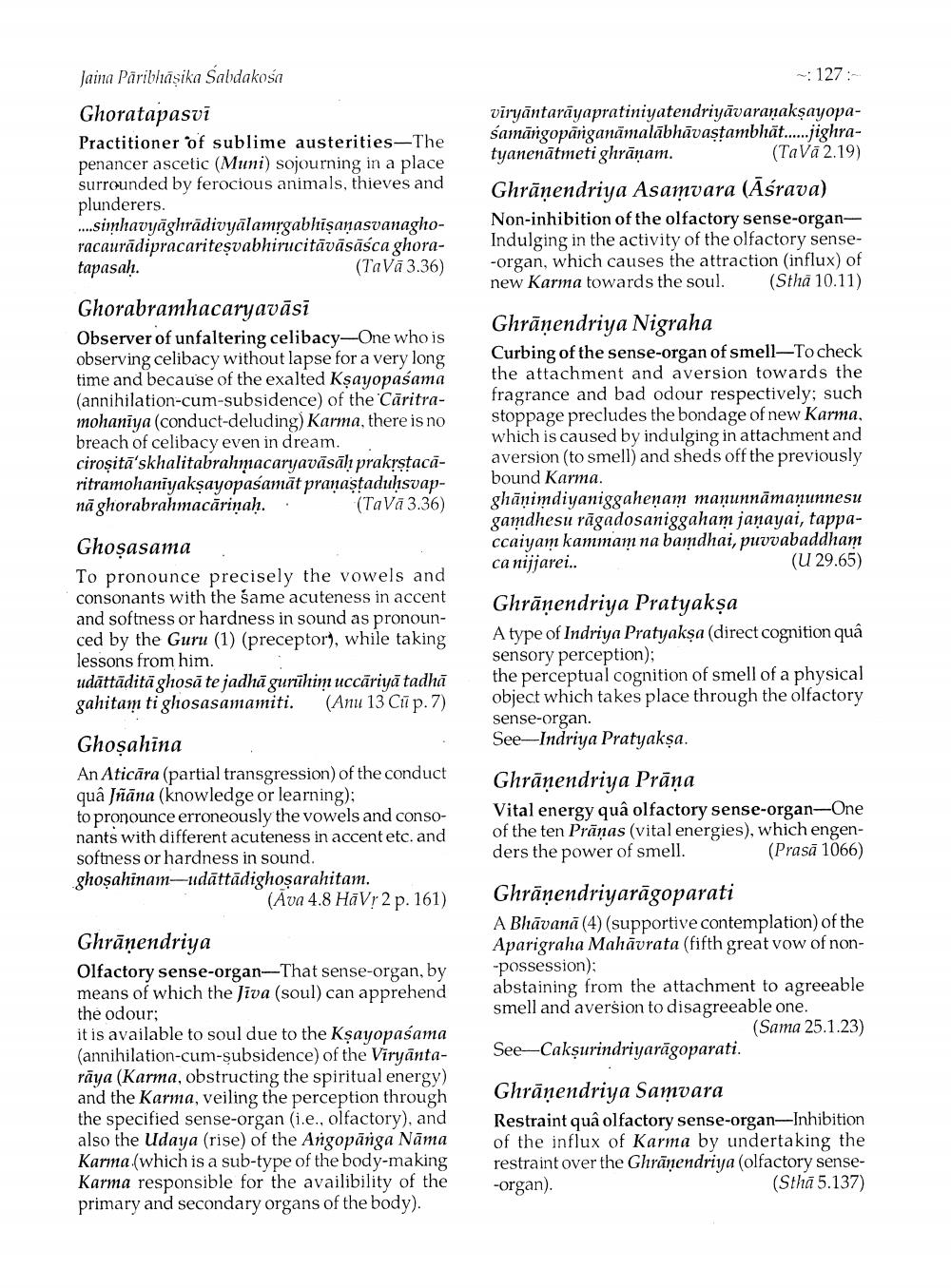________________
Jaina Paribhāṣika Sabdakosa
Ghoratapasvi
Practitioner of sublime austerities-The penancer ascetic (Muni) sojourning in a place surrounded by ferocious animals, thieves and plunderers.
.....simhavyāghrädivyalamgabhiṣaṇasvanaghoTacaurãdipracariteṣvabhirucitäväsäśca ghora
(Tavā 3.36)
tapasaḥ.
Ghorabramhacaryavāsi
Observer of unfaltering celibacy-One who is observing celibacy without lapse for a very long time and because of the exalted Kṣayopaśama (annihilation-cum-subsidence) of the Caritramohaniya (conduct-deluding) Karma, there is no breach of celibacy even in dream. cirosita'skhalitabrahmacaryavāsāḥ prakṛṣṭacăritramohaniyakṣayopaśamāt praṇaṣṭaduḥsvapna ghorabrahmacarinah. (TaVa 3.36)
Ghoşasama
To pronounce precisely the vowels and consonants with the same acuteness in accent and softness or hardness in sound as pronounced by the Guru (1) (preceptor), while taking lessons from him.
udättäditä ghosā te jadhā gunīhim uccariyātadhā gahitam ti ghosasamamiti. (Anu 13 Ci p. 7)
Ghoşahina
An Aticara (partial transgression) of the conduct quá Jana (knowledge or leaming):
to pronounce erroneously the vowels and consonants with different acuteness in accent etc. and softness or hardness in sound. ghosahinam-udättädighosarahitam.
(Ava 4.8 HaVy2 p. 161)
Ghränendriya
Olfactory sense-organ-That sense-organ, by means of which the Jiva (soul) can apprehend the odour;
it is available to soul due to the Kṣayopasama (annihilation-cum-subsidence) of the Viryantaraya (Karma, obstructing the spiritual energy) and the Karma, veiling the perception through the specified sense-organ (i.e., olfactory), and also the Udaya (rise) of the Angopanga Nama Karma (which is a sub-type of the body-making Karma responsible for the availibility of the primary and secondary organs of the body).
~: 127
viryantarayapratiniyatendriyavaraṇakṣayopaSamangopanganämalabhavaṣṭambhat......jighratyanenätmeti ghrāṇam.
(Tava 2.19) Ghranendriya Asamvara (Ăśrava) Non-inhibition of the olfactory sense-organIndulging in the activity of the olfactory sense-organ, which causes the attraction (influx) of new Karma towards the soul. (Stha 10.11)
Ghränendriya Nigraha
Curbing of the sense-organ of smell-To check the attachment and aversion towards the fragrance and bad odour respectively; such stoppage precludes the bondage of new Karma. which is caused by indulging in attachment and aversion (to smell) and sheds off the previously bound Karma.
ghanimdiyaniggaheṇam maṇunnāmaṇunnesu gandhesu ragadosaniggaham jaṇayai, tappaccaiyam kammam na bandhai, puvvabaddham ca nijjarei.. (U 29.65)
Ghränendriya Pratyakṣa
A type of Indriya Pratyakṣa (direct cognition quá sensory perception);
the perceptual cognition of smell of a physical. object which takes place through the olfactory sense-organ.
See-Indriya Pratyakṣa.
Ghränendriya Praṇa
Vital energy quâ olfactory sense-organ-One of the ten Pranas (vital energies), which engenders the power of smell. (Prasă 1066)
Ghrāṇendriyarāgoparati
A Bhāvanā (4) (supportive contemplation) of the Aparigraha Mahavrata (fifth great vow of non-possession):
abstaining from the attachment to agreeable. smell and aversion to disagreeable one. (Sama 25.1.23)
See Cakṣurindriyarägoparati.
Ghranendriya Samvara
Restraint quâ olfactory sense-organ-Inhibition of the influx of Karma by undertaking the restraint over the Ghränendriya (olfactory sense-organ). (Sthat 5.137)




